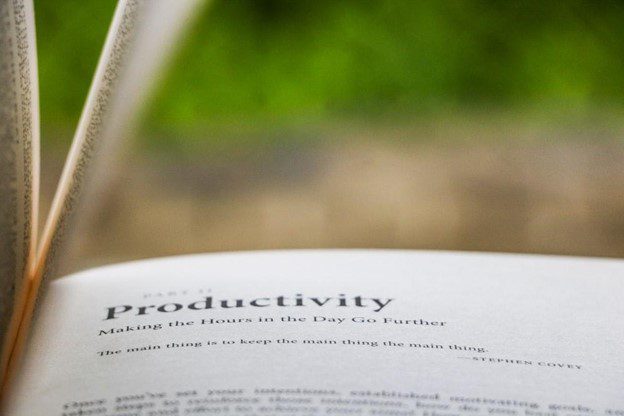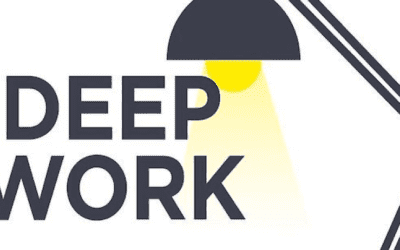Whether you work in an office or remotely, it seems that the number of distractions that we face in our daily lives is only increasing every day. As improved technology and continued innovation – particularly in the software space – has given us countless tools to use to boost our productivity and stay connected with each other, it has also perhaps provided too many options.
When the “traditional office” was in its peak before remote working began to take hold, if you needed to talk to your coworker you would either call them or go to their desk. Of course, many meetings would still take place and so too would time-wasting or non-productive activities like office gossip or off-topic conversations. However, these activities, which are perhaps inherent to human behavior, were only the beginning.
A 2012 McKinsey study found that workers are not doing value-added work for most of the work week. The study found that reading and answering e-mails accounted for 28% of the average week, searching and gathering information accounted for 19%, communicating and collaborating internally accounted for 14%. This meant that the remaining 39% was the amount of time workers spent on role-specific tasks. It’s safe to say that as more lines of communication have opened with the advent and widespread implementation of other tools like Slack, MS Teams, etc. It has only led to more ways for people to communicate. While this can be good for things like collaboration, sharing ideas, and bringing people around the world together, it can hinder the amount of productive work that we are able to get done.
This is where the concept of “deep work” comes in. While it may be a buzzword for some merely capturing the mood in a digital zeitgeist. The concept of deep work undoubtedly can show you how to excel in an increasingly distracted world.
What is “Deep Work?”
Deep work refers to cognitive depth, and of course, nothing to do with elevation. Specifically, it refers to the ability to work in a “deep” or highly focused state that lasts for a long period of time without any distraction or interruption. It was coined by Cal Newport, an associate professor of computer science at Georgetown University. In his book Deep Work: Rules for Focused Success in a Distracted World he goes on to say specifically: “the ability to perform deep work is becoming increasingly rare at exactly the same time it is becoming increasingly valuable in our economy. As a consequence, the few who cultivate this skill, and then make it the core of their working life, will thrive.”
But to better understand deep work, it’s also beneficial to understand some of the related and interconnected concepts.
Shallow work: Tasks that aren’t cognitively intensive provide little added value and are easily replicable. This happens to be most of the “work” that takes place. It includes responding to emails, scanning websites, and using social media.
Cognitive fitness: Like physical fitness, it’s a measure of endurance. Specifically, it’s the ability to focus without distraction and to get optimal performance from your brain to b able to work deeply.
Task residue: First coined by Sophie Leroy, it’s when multitasking, or switching from one task to another, the residue is the residual attention that is still ruminating on the former task.
Depth philosophy: Your unique methodology for deep work. This includes various components and specific to each person. It can include removing shallow work, allocating specific periods of time for deep work in your daily routine, and more.
Does Deep Work Equal Productivity?
It undoubtedly has a significant impact on productivity. The ability to execute deep work, according to Newport, is a key to gaining a competitive advantage in the workplace; those who practice it will outperform their peers in terms of quality and quantity of work – and hence land the best positions.
But, he claims, it has a deeper goal of happiness and satisfaction. Deep work, as opposed to shallow work (which is draining, stressful, and unsatisfying), requires people to accomplish something difficult and worthwhile.
He believes that the fulfillment gained from concentrating intently on a high-skill task can be applied to life in general. Not to mention the ability to immerse yourself in whatever you’re doing in one moment and achieve greater “presence.” So deep living equals good living.

The Guide to Deep Work
Unfortunately, for many of us, the idea of focusing deeply is something that we’ve forgotten or never learned at all. In school, the often-frivolous homework assignments seemed to just prepare us for the endless amount of shallow work we are likely to do in our lifetimes. So, it’s up to us to learn how and to put into practice the concept of deep work.
Learning How to Practice Deep Work
To begin to do deep work you first may need to learn how to practice deep work. The following strategies will help you to select your preferred form of deep work, build a routine, and provide a framework of principles and tactics to operate under to embrace the power of directed focus.
Choose a strategy
Newport describes four different types of deep work scheduling that you can choose from and hopefully one of the philosophies can work for you.
- The Bimodal Philosophy permits you to do a lot of deep work while still having time for other things in your life that you enjoy. Adopting this attitude successfully necessitates the ability to rearrange your year, months, or weeks as you see fit into larger chunks of intense labor.
- The Rhythmic Philosophy is perfect for people who have a reasonably consistent schedule. If you can predict how most of your days will go, it’s possible to set aside several hours each day for deep work, establishing a regular “rhythm,” and leaving the rest of your hours for shallow work.
- The Monastic Philosophy is perhaps the most dedicated type of deep work, hence the name that refers to the intense and dedicated nature of monks. While this theory provides the greatest potential for reward and the least amount of context switching, it is impracticable for most people who are obliged to complete a variety of tasks in their employment. It also limits your ability to take advantage of new chances because your standard reply to new obligations is “no.”
- The Journalistic Philosophy is an alternative for persons who are continuously on the road and have little to no consistency in their days This strategy necessitates awareness with your time and an acute ability to detect natural ebbs and flows in your day where you may be able to fit in 30 minutes or an hour or two of serious work. Unfortunately, this strategy is not suitable for novices and is likely to fail in the hands of those who are unfamiliar with deep work.
Build a deep work routine
Similar to other big changes in one’s life, setting a routine can help to cement the desired changes. And some important considerations to make regarding a routine include the location, duration, structure, and requirements.

Make a radical change
Whether it’s changing bad habits or losing weight, achieving your goals takes time and it comes in the form of small, incremental changes. However, sometimes this may not feel adequate. And unlike losing weight – which is impossible or at least extremely unhealthy if done too fast – making a radical change or “grand gesture” could provide some added motivation. An example of this may be asking your manager to let you work from home, or something similar.
Collaboration with others
Deep work seldomly means working with others. But collaboration at times can unleash a wave of creativity that we may not be able to achieve while working alone. It should be noted that it doesn’t mean attempting to juggle a conversation while trying to work on a project – this leads to shallow and unproductive work. Rather, time should be set aside for such collaboration sessions.

Be disciplined
Define what’s the most important and prioritize those tasks. Make goals and sub-goals to help you to achieve those tasks. Then occasionally conduct a review of how you are progressing towards achieving the goals and then make adjustments accordingly.
Prioritize downtime
A key component of deep work is the time you spend not working at all. Long working hours without downtime can be detrimental to the deep work experience and also can lead to adverse health outcomes like poor mental health and burnout.

Enhance Your Ability to Do Deep Work
Moving on from the basics of deep work, you then need to strengthen the practice of deep work. Like other skills, it takes methodological conditioning to improve your capacity to work deeply.
Make focus your default mode
Another way to put this is to make “offline” your default mode. But additionally, it should include avoiding everything that is not relevant to the work at hand, and this should be your default to maximize the amount of time for deep work. Some tips to do this are to set up blocks of time to answer emails and messages, use site-blocking apps to prevent distractions, and then also work offline if it’s possible with your work.
Add time pressure
To help intensify deep work, you can impose time limits on yourself. Of course, they should still be within the realm of possibility. By implementing a smaller time window, you are then forced to leverage deep concentration to finish a task. By racing against the clock, you need to avoid distractions and utilize every strategy possible. And by making it still in a possible time window, you won’t feel defeated if you don’t complete it.

Allow for deep thinking
Whether it’s work, play, or self-improvement, mindfulness is a very beneficial practice. And too often we can’t make room for it because our bodies and minds are always busy. You don’t need to go fully into a Zen-Buddhist meditation to help improve your deep work, you need to merely allow for deep thinking while your body is active. So while jogging, cleaning, driving, or showering instead of listening to music or a podcast, think about a professional problem or task at a deeper level to gain clarity.
Practice memory games
Another tactic that Newport recommends to prepare your mind for deep work is improving your memory. You can do this through various memory-enhancing exercises like learn a song or poem by heart or memorize words of a foreign language.

Eliminate Digital Distractions
Choosing a strategy and practice techniques are very important to allow for deep work. However, if you don’t remove the temptations and distractions, it will make it much more difficult if not impossible to achieve.
Carefully choose digital tools
You need to take back your time with the tools you choose both professionally and socially. By incorporating too many apps into your life, there are more avenues to be distracted.
Avoid social media
Perhaps one of the most obvious distractions to avoid. Since the algorithms of social media are designed to hold your attention, you need to avoid them like the plague during work times. It can be too easy to lose hours to mindless scrolling.
Replace internet entertainment
By distancing yourself from the internet and replacing it with analog things (books, exercise, etc.) you make it less likely that you will succumb to the minefield of distractions that are connected to the internet.
Purge Shallow Work from Your Life
Lastly, remove as much shallow work from your life as possible. In order to do this, you need to make a calculated effort to reduce the tasks that merely leech time away from your day. You can help yourself achieve this by methodically scheduling your day in a manner that promotes deep work. Also, you can limit your workday (incorporating a shortened time limit). However, perhaps the most effective way is to make yourself inaccessible. By removing yourself from the temptation of intermittent communication altogether, you can help yourself to focus on the work, rather than being continuously disrupted by emails and Slack messages. However, this needs to be considered in the scheduling phase and of course first communicated with your coworkers, so they know you won’t be reachable during certain times.
By incorporating these concepts into your life, you too can achieve the state of “deep work”.











